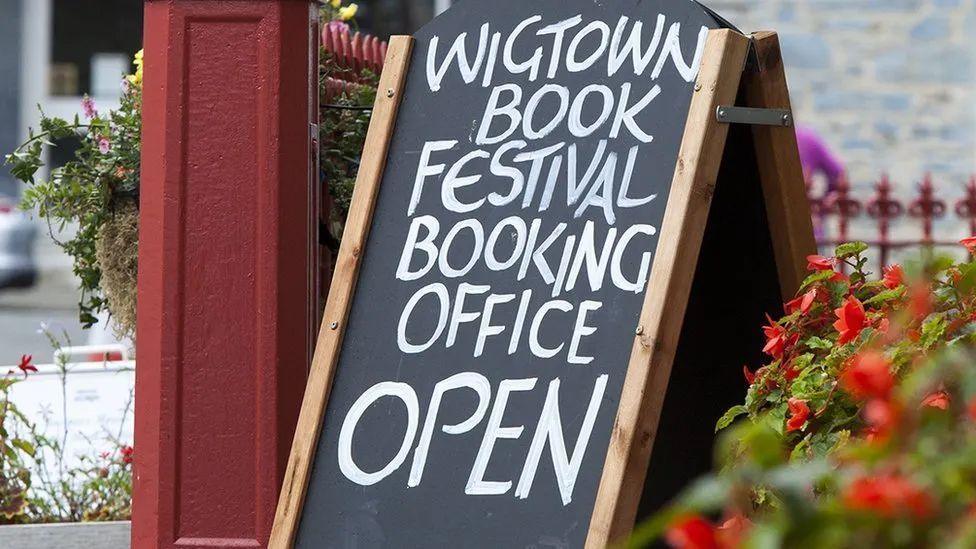Book festivals a 'soft target' for protesters - Harvie
Ditching book festival sponsors 'a soft target' - Harvie
- Published
Scottish Greens co-leader Patrick Harvie has "mixed feelings" over protests that led to three Scottish book festivals losing sponsorship deals.
Campaigners targeted investment firm Baillie Gifford regarding links to fossil fuels and companies that have supported Israel in the ongoing Gaza conflict.
The demonstrations have left events like the Edinburgh International Book Festival at risk of a funding shortfall.
Mr Harvie told BBC Scotland's The Sunday Show that the campaign "hasn't worked", and that book festivals were a "soft target" for protesters to focus on.
Campaign group Fossil Free Books demanded the festivals stop working with Baillie Gifford over links they claim the firm has to fossil fuel organisations and Israel, allegations which the company has denied.

But Mr Harvie said the campaign had not succeeded.
He said: "I have mixed feelings on this in the same ways that I do with Extinction Rebellion protests, which impact on people rather than on the targets like the big fossil fuel companies.
"If the target of that campaign was to get Baillie Gifford to divest from fossil fuels and from companies tarred by association with Israel, then it hasn’t worked.
"The objective shouldn’t have been to defund literary festivals."
Fossil Free Books told BBC Scotland that it was "disingenuous" for Mr Harvie to frame their actions in isolation.
In 2023 the climate change activist Greta Thunberg cancelled an appearance at the Edinburgh International Book Festival over its links with Baillie Gifford.
The company had sponsored the annual event for 20 years.
More than 50 authors went on to call on the festival to end its deal.
The then festival director Nick Barley said it would not have enough money to operate without private sponsorship.
Scottish Greens, Alba and Reform UK make pitch to voters
- Published9 June 2024
Who can I vote for in the general election?
- Published3 July 2024
But on 30 May the Edinburgh International Book Festival announced the deal had ended.
And last week it was confirmed Baillie Gifford's deals with the Borders Book Festival and the Wigtown Book Festival had also ceased.
Book festival organisers said the constant threat of disruption meant they would not be able to deliver events safely.
Mr Harvie said: "I don't think the goal was to shut down literary festivals.
"The goal should be to focus on the investors and the investment decisions that they make. That's a very legitimate goal.
"The danger here is a campaign that ends up hitting a soft target when it should have been aiming for a hard target like the investors."
In a statement, Fossil Free Books said Baillie Gifford "is not, and has never been, a sustainable or ethical source of funding for the arts".
The spokesperson added its aim is for festivals to work with writers and non-governmental organisations to "create ethical fundraising policies" going forward.
Protests this year have seen hundreds of writers call on literary events to stop their funding links to Baillie Gifford.
Singer Charlotte Church and comedian Nish Kumar pulled out of appearing at the Hay festival in Wales, another event that later dropped involvement with the firm.
However a number of other writers criticised the Edinburgh festival's decision, with nearly 70 authors signing an open letter calling the campaign against Baillie Gifford "deeply retrograde" and a "Pyrrhic victory".
Mr Harvie added that he hoped there would be more investment companies with "ethical criteria" and that he would like to see increased government involvement in subsidising cultural events.
A proposed Green policy is for stadium gigs - such as Taylor Swift at Murrayfield or upcoming concerts by American singer P!nk at Hampden Park - to have a £1 levy per ticket.
That would then be reinvested into smaller, grassroots venues, a stance supported by campaigning charity the Music Venues Trust.